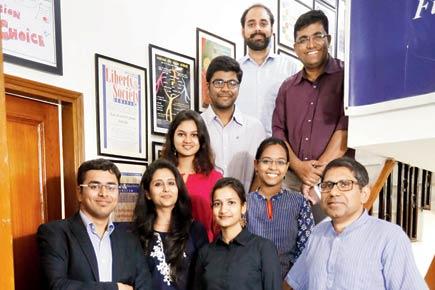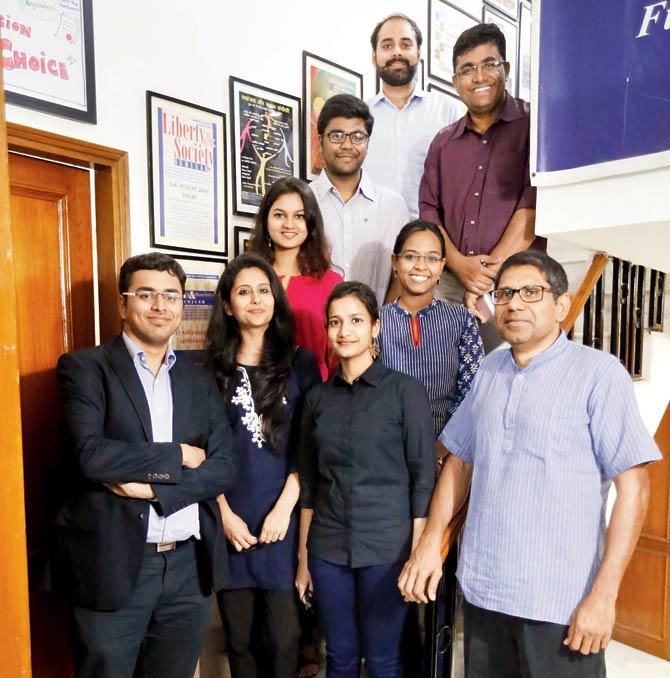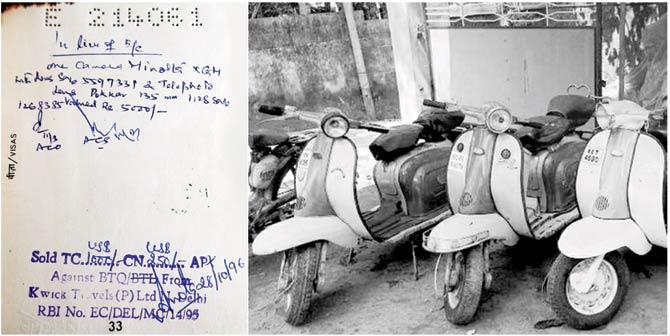Delhi-based think-tank, Centre for Civil Society is crowdfunding memories from the pre-1991 era. And the stories are as hilarious as they are scary

In a short, less than five-minute clipping, Sadanand Dhume, a writer and journalist based in Washington, recalls the years he spent growing up in India. “I remember we got a car, one of the first few Marutis. The Maruti 800 we got was called a deluxe car. Why was it deluxe? Because it had seat belts. It had an air conditioner which never really worked and what worked didn't work so well. And it had seat belts. And the idea that a small little car could be called DX or deluxe because it had seat belts told you a little bit about what India was like in those years.”

The CCS team with Neeraj Aggarwal (left) and Parth Shah (extreme right). In July, they hope to launch a coffee table book with stories and photos from the period. Pic/Ajay Gautum
Those years. Years of want, as Dhume terms them, are now finding their place in Indian memory thanks to a crowdfunding initiative by Delhi-based think-tank Centre for Civil Society, founded in 1997 by Parth J Shah, a former professor of economics at the University of Michigan. Speaking over the phone from Delhi, he asks, “Do you know that half of India was born after 1991?” The year is significant in Indian history. It’s the year that Rajiv Gandhi was assassinated. It’s also the year that Congress leader PV Narasimha Rao stepped into the prime ministerial role to fill the vacuum at the Centre and initiated economic reforms with support and advise from Dr Manmohan Singh, P Chidambaram and Jairam Ramesh, to liberalise the economy. The result of their efforts is that today you can walk into a bike (or car) showroom, swipe a card and ride out on your latest purchase. In the pre-1991 era, this would have taken eight years.

Most of the stories shared on the website discuss the scarcity of goods and services. For instance, how it would take years to get a scooter (right) or even a phone connection. Those travelling overseas would also have to mention the serial number of the camera they were carrying (left)
Shah, born in 1961, recalls the story of his father Jayantilal's first scooter purchase. “He graduated in 1958 and decided to buy one. He paid the local dealer. At the time, the wait for a scooter was eight years and you had to pay the full price upfront.” Giving us time to express our shock, he continues, “In the meanwhile, he got married. My mother had a brother in America. The policy at the time was that if you paid the price in dollars, you could jump the queue. He withdrew his first application and applied for another scooter, this time paying in dollars. He got his vehicle in less than a year.”
Shah explains why the era from 1959 to 1990 was called Licence Raj. In short, not just did companies need a licence to produce something, they needed to justify why they intended to produce what they produced. It gets worse. There was also a cap on how much one could produce — no less, but also, no more. For example, a company producing scooters would not be allowed to produce more than a certain number every year.
Thus, it was the incredible time when a vehicle, bought at say R30,000 at the showroom could be sold for Rs 50,000 outside of it.
Lest these stories be forgotten, Shah and the team at CCS have launched a website called Indiabefore91 where stories from the period are being shared. While the likes of Jairam Ramesh, Shashi Tharoor and author Gurcharan Das have shared their memories, CCS wants to reach out to a diverse audience. To achieve this, they have announced a fellowship, calling for applicants from across the country.
Already, the site has a few videos and texts stories from the period. CCS has also uploaded pictures, cartoons and newspaper cuttings from the era that illustrate their point.
The exercise of hunting for stories will continue till July, after which the team hopes to wind-up operations and convert all the data gathered until then into a coffee-table book.
“We want people to go out and interview those who have stories to tell from this era. We are not looking for any qualifications,” says IIT-Delhi graduate Neeraj Aggarwal, who has been working on the project with CCS since it began in October 2015. Aggarwal, born in 1991, is as amazed as the project’s target audience at the stories collected — from farmer Atar Singh’s recollection of how sugar would be a luxury to stories by Mohit Sadanand, and CCS member Premila Nazareth on the caps on foreign travel.
Both Sadanand and Nazareth recall how the Reserve Bank of India would allow a maximum of $100 to be carried as foreign exchange on a trip overseas. “So you had to make all kinds of elaborate arrangements with relatives and other friends for money to be kept there for you, to then use when. One of my clearest memories is of my grandmother, a very tiny, little old lady stitching rolled up dollars into the hem of her sari skirt.
And...there was always this fear that you are in violation of some law or the other or could be caught. So travelling abroad was never a joyful experience, it was always an experience wrapped in some kind of nervousness that you might get caught or you might run out of money overseas. For me this is really one of the biggest changes post 91.”
 Subscribe today by clicking the link and stay updated with the latest news!" Click here!
Subscribe today by clicking the link and stay updated with the latest news!" Click here!










